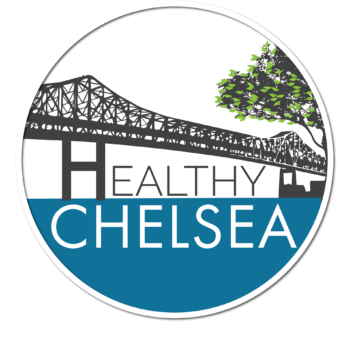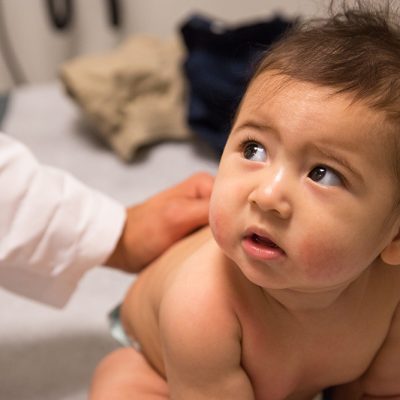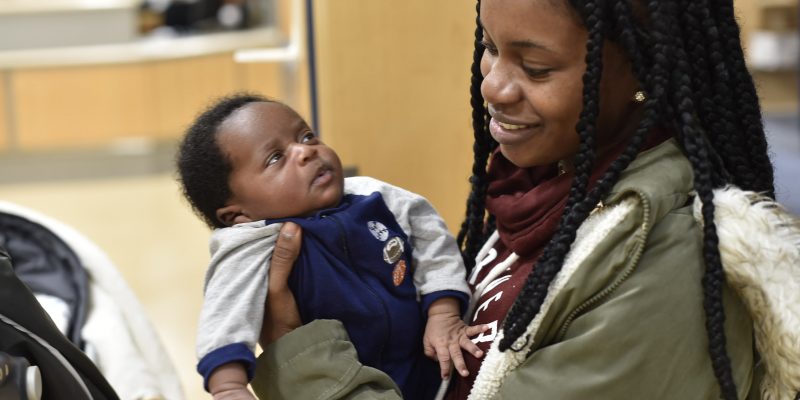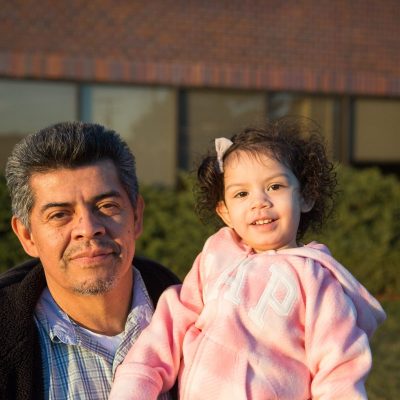Healthy Chelsea’s Early Childhood Initiative comes from the compelling developmental science literature that says what happens in early childhood sets the stage for a person’s health throughout their life. This initiative brings together multiple community stakeholders to promote positive and culturally-informed early childhood experiences. We believe that all children deserve the opportunity to develop important foundational skills between birth through the first five years of life.
The Early Childhood Initiative, supported by the Early Childhood Comprehensive Systems Grant, established the Chelsea Early Childhood Network (CECN) in 2017. CECN partners developed a vision for the Network.
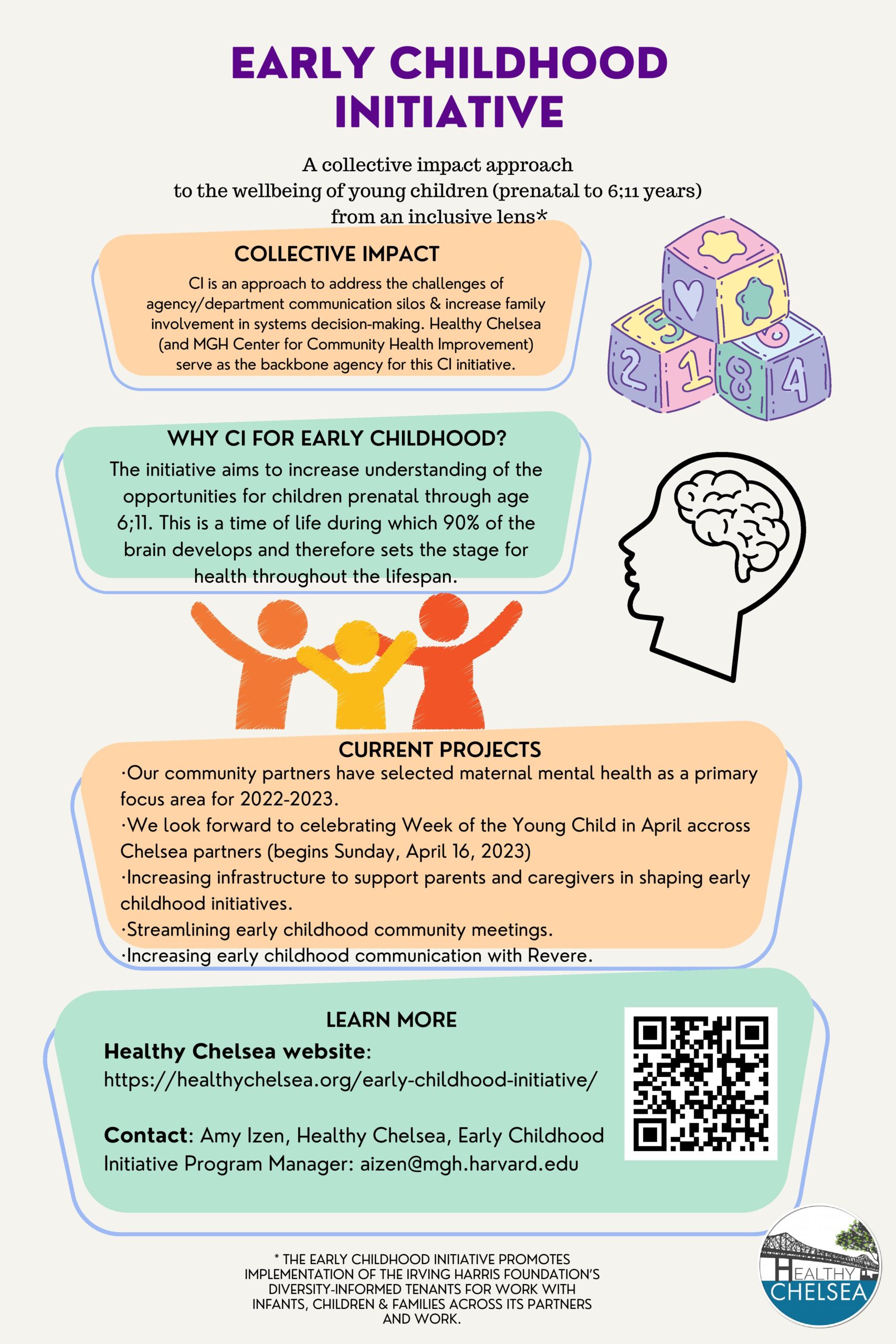
The Chelsea Early Childhood Network is a coordinated initiative between families, community partners and agencies focused on providing equal opportunities for Chelsea children, birth to five, and their families by engaging in proactive efforts which will aid in child growth and development, and serve as a catalyst for family success.
Chelsea was awarded the Early Childhood Comprehensive Systems (ECCS) grant in August 2016. Chelsea is one of two communities in the Commonwealth of Massachusetts which was awarded the ECCS grant through July 2021. This grant provides monetary resources to Chelsea and Springfield, as well as to the Commonwealth of Massachusetts, to work collaboratively and comprehensively to strengthen the developmental health of children. Massachusetts is one of 12 states which received ECCS grants to improve early childhood developmental outcomes.
Parents and caregivers are the primary “brain architects” in the earliest years of life. It is essential that all caregivers understand how much child development happens between ages 0-5 years and how enriching adult-child interactions literally “wire the brain” for success. The Early Childhood Initiative engages parents and caregivers as leaders in shaping and sharing these messages throughout the community, as well as giving input as to how the grant’s efforts can best impact the systems and environments for young children in the community. Contact the CECN Family Navigator, Angelica Gonzalez Olmo Gonzalez at aolmo@capicinc.org to join the CECN Family Advisory Committee (FAC). The CECN FAC meets monthly in Chelsea, MA. All are welcome to participate!
When children turn five years old and have opportunity to attend public school, they are connected to enriching learning opportunities, and parents/caregivers are connected to teachers and resources to answer questions. The Early Childhood Initiative is building the “Chelsea Early Childhood Network” that will better serve children and families during the crucial first five years of life, where this crucial infrastructure has previously not existed.
The Chelsea Early Childhood Network (CECN) has brought together and supported the following resources:
- For families
- Boston Basics
- For upcoming events, visit the CECN Calendar to stay up to date on all the latest CECN opportunities!
These organizations have been actively engaged in shaping the Chelsea Early Childhood Network. If you interact with young children and their families in Chelsea and have not yet joined this initiative, we’d be thrilled for you to join us.
- CAPIC Head Start
- Chelsea Community Connections Coalition
- Chelsea Public Library
- Chelsea Public Schools
- Chelsea-Revere Family Network
- Children & Family Services of Lynn, Chelsea Branch
- El Potro
- Families First
- First 1,000 Days Study at MGH Chelsea
- Harbor Area Early Childhood Services (Early Intervention)
- MA Department of Public Health
- MGH Chelsea Community Health Improvement/Healthy Families
- MGH Center for Community Health Improvement/Healthy Chelsea
- MGH Chelsea Pediatrics
- MGH Speech & Language Department
- Neighborhood Developers, The
- Nurtury
- Outdoor Rx (Appalachian Mountain Club)
- Raising a Reader MA
- Roca
- Women, Infant & Children (WIC) Program at MGH Chelsea
- United Way
Please contact Amy Izen, M.S., CCC-SLP, Healthy Chelsea ECCS Grant Coordinator at aizen@mgh.harvard.edu if you'd like to:
- join our email list
- ask a question or share a comment
- participate in in upcoming events and initiatives (e.g. bimonthly partner meetings, Week of the Young Child, Family Advisory Committee meetings)
You can also learn about recent work in more detail by exploring the quarterly newsletters below. Thank you for your interest!
May 2019 Newsletter
January 2019 Newsletter
October 2018 Newsletter
Did You Know?

- The brain is the only organ of the body that is not fully formed at birth, and, at birth it is about 25% of the size it will grow to be.1
- Most of brain growth happens between birth and 6 years of age, during which time 90% of the brain develops.2
- Young children connect brain cells at a rate of one million new connections every second!1 Because the brain develops in these first years of life, it is a person’s experiences that develops their brain.
- Striving to speak 30,000 words per day and positive parent-child attachment sparks the most optimal brain development.3
- Other factors impact children’s brain development as well, such as access to enriching early educational programming, exposure and response to stress and trauma, and the environment.
References
1Center on the Developing Child (2009). Five Numbers to Remember About Early Childhood Development (Brief). Retrieved from www.developingchild.harvard.edu.
2Stiles, J., & Jernigan, T. L. (2010). The Basics of Brain Development. Neuropsychology Review, 20(4), 327–348.
3Hart B., & Risley, T.R. (1995). Meaningful Differences in the Everyday Experience of Young American Children. Baltimore, MD: Paul H. Brookes Publishing Company.
